Staying Cool in Las Vegas with the CRRC

By Lauren White.
The CRRC Annual Summer Meeting updated, educated and inspired from the ground up.
With a view of Las Vegas on the 51st floor of the Palms Casino and Resort, the Cool Roof Rating Council (CRRC) Annual Summer Meeting kicked off on the morning of June 5, 2024! With record attendance, over 80 people flew from 23 different states, Puerto Rico and Washington D.C., to Las Vegas to hear updates regarding pavements, financials, wall ratings, international outreach and more. RoofersCoffeeShop® was honored to be one of the Silver sponsors of the event. Other sponsors include: ACE Laboratories and TOPPS Products Inc. as Platinum sponsors; Duro-Last, Climate Resolve, Western Colloid, Covia and MACOMA as Gold sponsors; Westlake Royal Roofing Solutions and DOW as Silver sponsors.
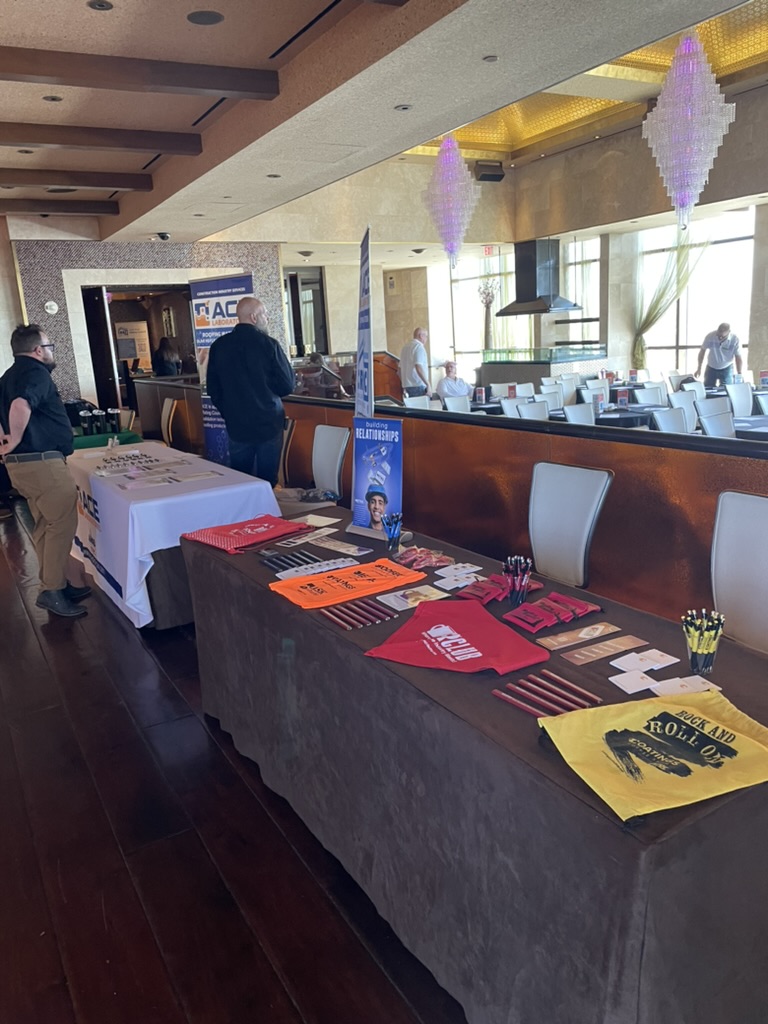
Attendees represented a range of professionals from state energy offices, laboratories, distributors, codes and compliance divisions, universities and even Google! Some companies in attendance included: Sherwin-Williams, IB Roof Systems, Johns Manville, Malarkey Roofing Products, General Coatings, Western Colloid, Polyglass, ARMA, 3M, GAF, ACE Laboratories, among others.
After breakfast and an opportunity to network and meet new people, we kicked off the day introducing ourselves, approving the minutes from last year and received administrative updates. This meeting is an opportunity for board members, CRRC members and staff, and interested individuals to get an overview of what the CRRC has been up to over the year – and it’s been a busy one! Between the Ratings Codes and Standards Committee submitting proposals to the ICC, IECC, among others, an update regarding technical research and the difference between Rapid Ratings versus the three-year aged ratings and what that means for rating potentials, the CRRC isn’t slowing down anytime soon!
It was a full day but a few committee update highlights included:
- CRRC Roof Directory standards – In order for a product to be on the CRRC Roof Directory as an actively rated product, it must be validated every seven years. Products are constantly required to be evaluated on their effectiveness and reflectivity.
- Pavement rating program – Pavement is roughly 30% of urban surfaces and other than trees, cool pavements have the greatest UHI (Urban Heat Island) reduction potential due to the fact that pavement is a dark, heat trapping surface. The CRRC is working on creating a pavement rating program.
- Accredited Independent Test Labs (AITL) – In order to be a CRRC-approved laboratory, they must be ISO/IEC 17025 accredited, attend laboratory training, submit all required documentation, maintain test methods on accreditation scopes and participate in biennial Interlaboratory Comparison Study (ILC). These AITLs are independent from manufacturer and distributors. Currently there are seven approved Roof AITLs with the goal of CEPT University in Ahmedabad, India being the eighth AITL this year. CEPT University is a multidisciplinary think tank and Stacy Weister, CRRC technical manager, will be traveling to India this summer to train with them.
Education and outreach
Education and outreach continue to be a large focus of the CRRC. Everyone in this room is familiar with what’s happening with this program, but there are still many out there who aren’t. If people knew that the information regarding standards, ratings, and more are available from an independent, third-party program, they’d use it. So, you’ll be seeing more podcasts, webinars, articles and outreach from the CRRC team to continue to get the word out and spread the cool news!
Part of that education is through the CRRC continuing education program. This program is now available on the AEC Daily platform and is the 14th most popular course on that platform. This program is registered with 28 U.S. and Canada organization that provide CE credits, including: AIA, BGCI, NAHB, IIBEC. Another part of their outreach includes a STEAM educational curriculum for middle schools. After realizing that most of their educational materials are geared towards professionals, and in an effort to educate the general public, the CRRC realized that schools are a great platform to start the conversation and educate about cool surfaces. The goal of this curriculum is to help them learn about solar absorbance, urban heat, cool surfaces and the role architectural surfaces play in mitigating the effects of heat. Part of the curriculum is a series of three videos and we were some of the first people to have a sneak peek of one of them!
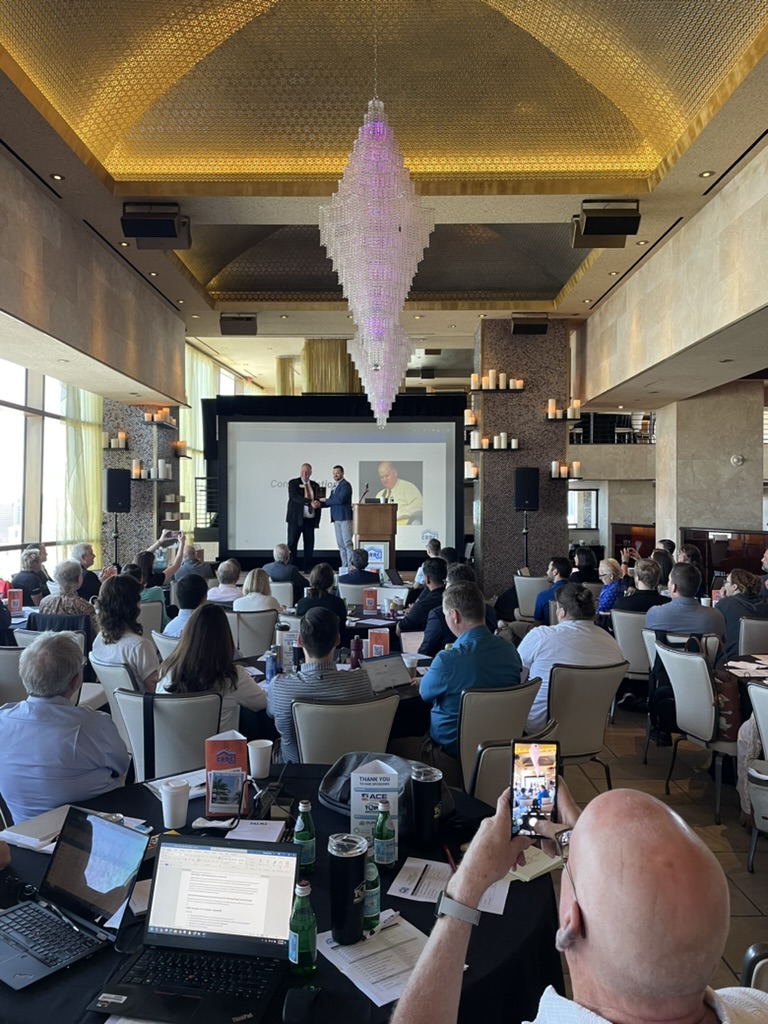 Marty Hastings Award
Marty Hastings Award
The Marty Hastings Award was started in 2011 to honor Marty Hastings, a longtime CRRC board member and contributor. The recipient of this award is someone who makes great contributions to the CRRC and their efforts. The 2024 recipient is George Daisy who currently serves on the Technical Committee and has previously been involved in a variety of ways including being a CRRC board member and serving on the Education Committee. In addition to the award, a monetary donation is made to a charity of the recipient’s choice. Mission Teens, Inc. was the charity George chose and is a program that helps people overcome their addictions. There are 20 centers around the U.S. for this full residency program.
International outreach update
Last year, India was identified as being a massive potential market for cool roofs and walls based on the pace of new building construction and the amount of cool roof requirements at the state level and engagement form the national government. Phase 1 started in December 2023 and wrapped up in February 2024 and included identifying and meeting with key stakeholders, discussing collaboration and resource needs and strategic actions with stakeholders. In-person meetings were also held with national and state governments, technical stakeholders like universities and labs, in addition to civil society and the industry overall, focusing on tile and metal manufacturers. Phase 2 will include continuing to advance stakeholder relationships and integrate CRRC into local initiatives, identify and secure funding to provide advice and technical support to stakeholders.
Guest speakers – Cooling from the ground up
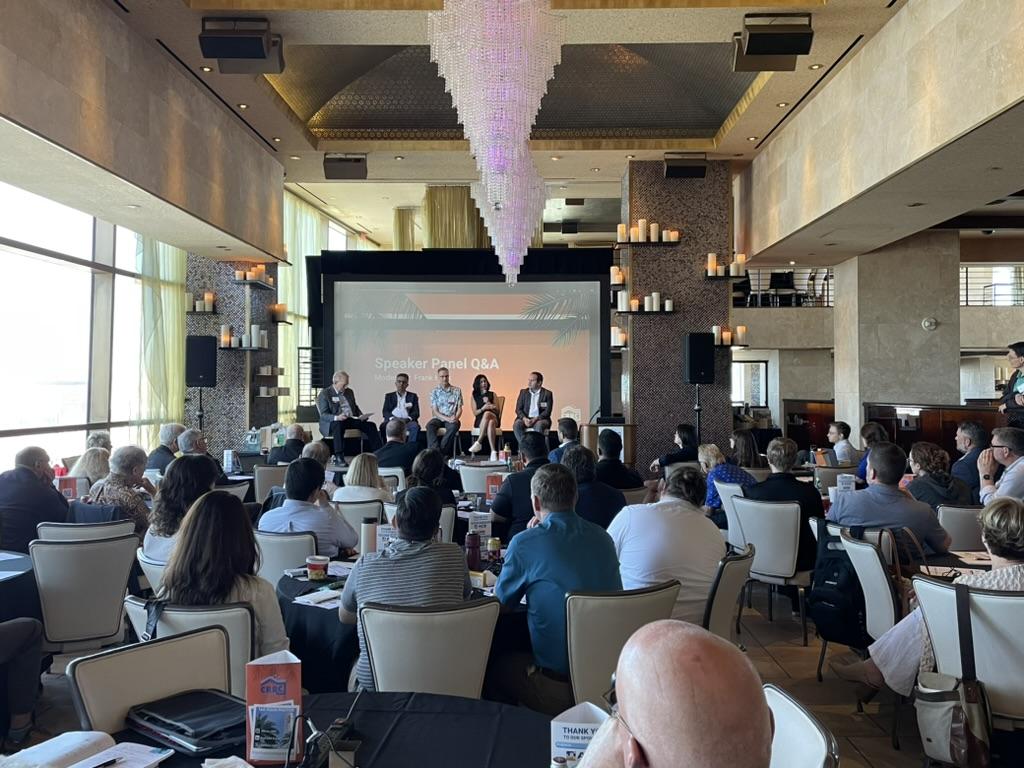
City of Phoenix experience with cool pavement coatings
Ryan Stevens with the City of Phoenix presented a 2020 pilot project where an asphalt seal coat product was applied to asphalt roads. This coating is light in color, enhances reflectivity, can be applied with a squeegee or sprayed on and is compatible with existing asphalt surfaces. A safe, non-toxic material that’s suitable for typical activities on a road is durable like a regular seal coat. So far, the study has shown that the surface temperature of the cool pavement (CP) on average was cooler than asphalt concrete. While 100 miles of cool pavement have been installed, the study is ongoing, and moving forward they’re looking for longer-term performance testing, new types or colors of cool pavement and high-end air temperature tests. Already based on consumer feedback they changed the color from an off white, which they used initially, to a light gray which provides less glare and was well received by consumers.
A study of solar reflectivity of coatings for exterior wall applications
Professor Ray Fernando from California Polytechnic State University has been the occupant of the Arthur C. Edwards Endowed Chair in Coatings Technology and Ecology since 2002. He is also the director of Cal Poly’s Kenneth N Edwards Western Coatings Technology Center. Ray provided a technical overview of different wall coatings and how reflective they are. A lot of very technical data was presented that definitely piqued the interest of many people in the room, but was a bit too technical for me without a science background. A few takeaways from his research and findings included:
- All tinted films have perfect contrast ratio
- Hybrid pigments can provide small increases of solar reflectance (SR)
- Hollow spherical materials provide greater increases in SR
- IR reflective black pigments provided the highest increase in SR
Planning cooler cities with Google’s Cool Roofs Tool
Mansi Kansal and David Fork with Google Research presented on how Google hopes to help local governments plan, advocate and evaluate ways to increase cool roof adoption to mitigate the harmful effects of urban heat. Through their Cool Roofs Lab, they’re using high resolution, aerial imagery to infer reflectance at higher resolution to provide building level insights to help urban planners determine where to implement specific projects. This imagery, combined with socioeconomic data, can help determine which neighborhoods would benefit most from cool roof interventions. The Cool Roofs Lab is currently live in 15 cities, some of which include: Los Angeles, Phoenix, Nashville, New York, San Antonio and also Melbourne, Australia!
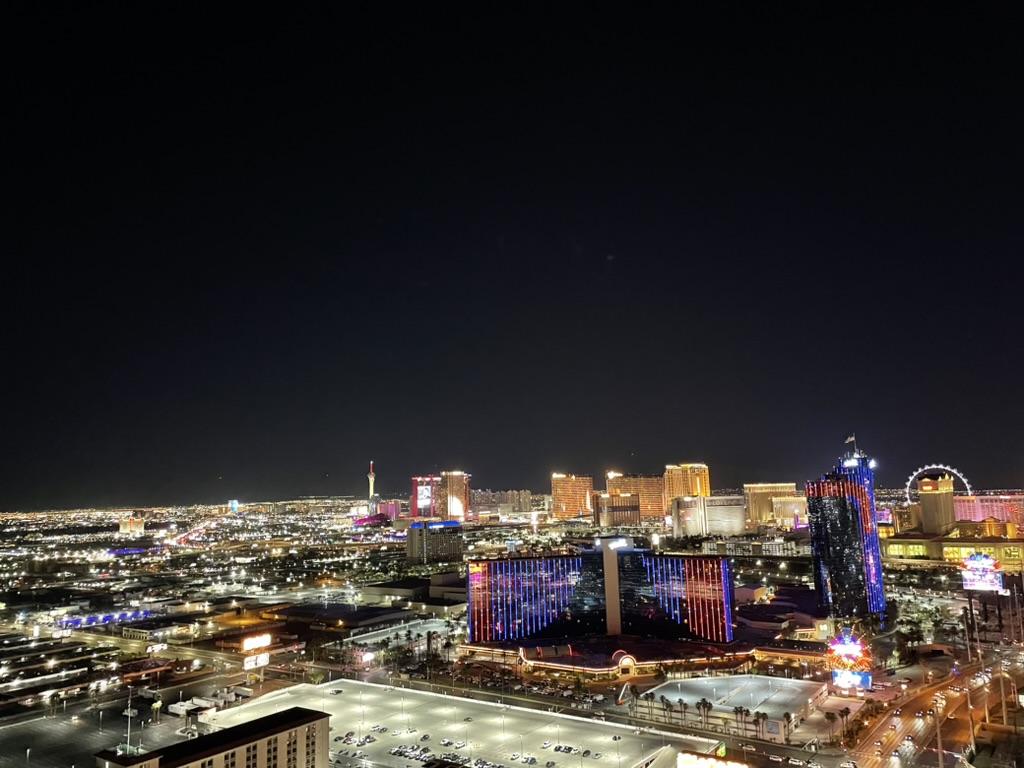
As a first-time attendee of this event, I was blown away at not only the organization of the day, but the amount of information, research and technology that’s out there is astounding. In such a big industry, it’s amazing to sit in a room with 80 people from all around the world who all have the same interests and want the same things for our future. To be amongst scientists, academics, contractors and people who are just curious about what’s new in the cool roof and wall landscape, was unique. And I can’t wait to see what else the CRRC does!
Learn more about Cool Roof Rating Council (CRRC) in their Coffee Shop Directory or visit www.coolroofs.org.
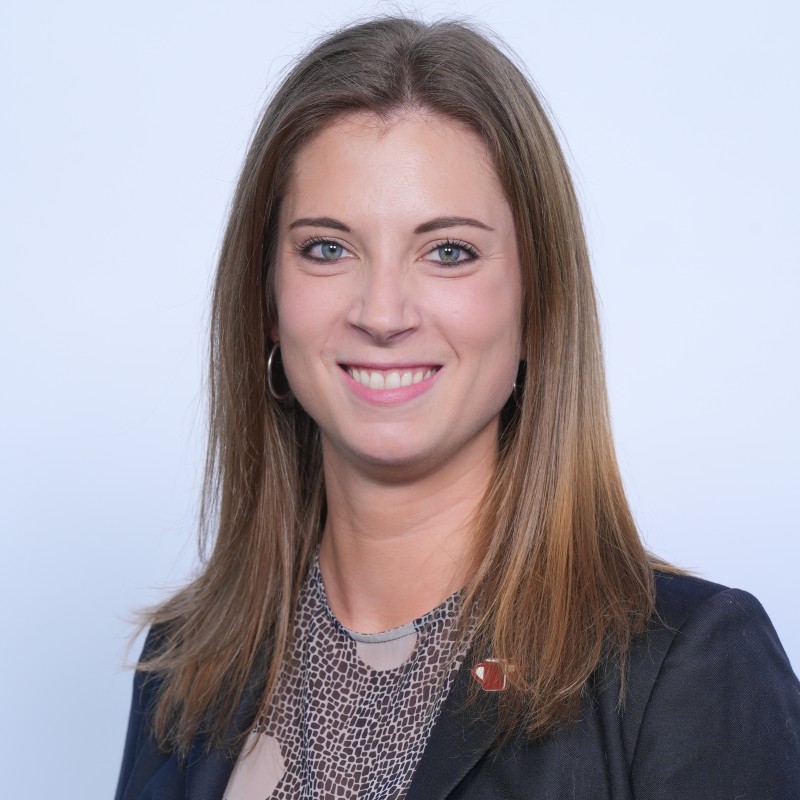
About Lauren
Lauren is the editor for RoofersCoffeeShop®, MetalCoffeeShop™ and AskARoofer™. When she’s not writing or reading articles, she's adventuring with her puppy Kira and trying new recipes.





















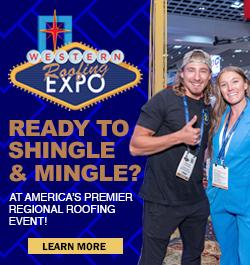

Comments
Leave a Reply
Have an account? Login to leave a comment!
Sign In